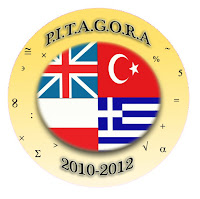DESCRIPTION
Potentiate Integration and Task for Adult learners Giving them Opportunities for Relations All over Europe.
The PIT-GOR project
aims at promoting education, cooperation, interchange and the mobility of
disadvantage adult group (immigrants, ethnic minorities, etc. ) coming from
European areas at risk regarding social exclusion, focusing on maths as a skill
needed to be potentate.
The PIT-GOR
project aims at:
1) Promoting
intercultural education and learning process;
To support the
learners’ participation and motivation, methods inspired by principles of active
participation and cooperation (learning-by-doing, ice-breaking, creating mixed
groups, teamwork).
2)
Potentiating competence in maths to improve the adult learners’ cultural
level by providing them with greater job opportunities in their own context and
across Europe;
The adult learners
will increase their basic math skills and by means of activities as
problem-solving, maths-crosswords, logic games, they will also develop this
capacity becoming more flexible individuals, easily adaptable to different
environments and situations.
3) Improving the quality of European adult educational systems by reinforcing cooperation among partners’ organisations.
The teachers will
meet, organize conferences or seminars to compare the different types of
educational systems and to exchange good practices, information and
experiences.
4) Increasing
foreign languages learning and ICT to promote better mutual understanding,
mobility all over Europe, and also facilitating positive interaction and
relationships in spite of the participants’ basic differences and cultures.
The learners will be
trained in ICT, foreign languages and made aware of these as important means on
communication.
5) Stimulating
creativity and artistic expression to increase the interest and socializing
process between the learners taking into consideration their problematic social
and economic backgrounds
The learners will
express their creativity in different forms (photos, paint, write) and will
discover also the creative aspect of maths, considered as an unimaginative
subject. Since, maths courses will be integrated with various activities
(work-shops on geometrical shapes, drawing on the numbers).
FUNDAMENTAL ASPECTS:
- The cultural theme (web-page, photos, articles, videos);
- The science section (basic maths skills, ICT information and foreign language classes);
- The social theme (activities such as personal introduction, ice-breaking, role-playing games and simulation exercise);
- The art theme (painting, photography, writing, music, videos in line with the subjects and themes of the project);
GRUNDTVIG:
The Grundtvig programme is a European founding programme that is part of the European Commission’s Lifelong Learning Programme 2007- 2013 and aims to strengthen European dimension adult education lifelong learning across Europe.
It is open to anyone in adult education. This includes adult learners, teachers and trainers from a variety of organizations including local authorities, non- governmental organizations, charities, universities, community groups, etc.
‘Adult’ in the Grundtvig programme refers to all persons over the age of 25 and all persons aged 16- 24 who are no longer undergoing initial education within the formal education system.
The Grundtvig programme provides founding for a wide range of activities. Some examples are basic skills, foreign languages, parental education, arts and culture projects. All projects involve working with European partners and offer a learning and personal development experience for staff and learners.
OBJECTIVES :
Main objectives:
Main objectives:
•Promoting intercultural education and learning process;
•Improving the quality of European adult educational systems;
•Increasing basic maths abilities;
•Increasing foreign languages learning and ICT;
•Making learning process more attractive;
•Stimulating creativity and artistic expression;
PLANS :
What are we planning?
•Find new work methods and organization of work teams;
•Present the project to the members of each organisations and to potential learners;
•Create of maths and linguistic classes;
•Promote activities and dissemination of products and output of the project on local, national and European level ;
•Create Booklets “Games with maths”;
•Create the Pocket Dictionaries “When Europe talks with numbers”;


No comments:
Post a Comment